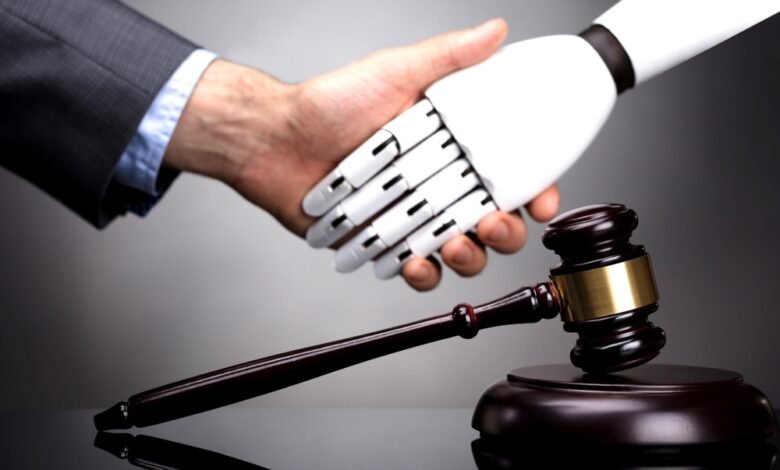Unlocking the Future: 10 Ways AI Can Benefit Your Law Firm

Artificial Intelligence (AI) is no longer a futuristic concept; it’s here, and it’s revolutionizing the way businesses operate across various industries. The legal profession is no exception. While traditionally resistant to technological change, law firms are now realizing the potential of AI to transform their operations, improve efficiency, and ultimately provide better services to their clients. In this article, we will explore 10 Ways AI Can Benefit Your Law Firm.
Artificial Intelligence Can Benefit Your Law Firm
The legal profession is often seen as traditional and resistant to change. However, in recent years, there has been a noticeable shift towards adopting new technologies. Law firms, both big and small, are starting to realize the importance of adapting to these changes to stay competitive in the market. One of the most significant technological advancements impacting the legal industry is Artificial Intelligence (AI). 10 Ways AI Can Benefit Your Law Firm is not just a buzz phrase, but a reality that law firms need to embrace.
Read More: AI And The Legal Industry: How Can Law Firms Use it?
AI in Legal Research
Legal research is a crucial part of any law practice. It involves searching through vast amounts of legal documents, case laws, statutes, and regulations to find relevant information. This process is usually time-consuming and requires a lot of effort. However, AI can streamline this process by quickly analyzing large amounts of data and providing relevant information. AI-powered legal research tools can help lawyers find the most relevant cases, statutes, and regulations, saving time and effort.
Predictive Analysis
Predictive analysis involves using historical data to make predictions about future events. In the legal context, this can include predicting the outcomes of cases based on past decisions. AI-powered predictive analysis tools can analyze vast amounts of historical data to provide insights into the potential outcomes of a case. This can help lawyers to better strategize and prepare for their cases.
Document Automation
Document automation involves the automatic generation of legal documents based on pre-set templates and data input. This can include contracts, wills, and other legal documents. AI-powered document automation tools can help to streamline this process, reducing the time and effort required to create legal documents. This can help law firms to be more efficient and provide better services to their clients.
Chatbots and Virtual Assistants
Chatbots and virtual assistants are AI-powered tools that can interact with clients and provide information or perform tasks. In the legal context, chatbots and virtual assistants can help to answer frequently asked questions, schedule appointments, and provide information about legal services. This can help to improve client satisfaction and free up lawyers’ time to focus on more complex tasks.
Legal Analytics
Legal analytics involves the analysis of legal data to provide insights into legal trends, judge’s behavior, and other important information. AI-powered legal analytics tools can analyze vast amounts of legal data to provide meaningful insights that can help law firms to make better decisions and strategize more effectively.
Contract Analysis
Contract analysis involves the review and analysis of contracts to identify potential risks and opportunities. AI-powered contract analysis tools can quickly analyze large volumes of contracts and provide insights into potential risks, such as unfavorable terms or clauses that could lead to litigation. This can help law firms to better advise their clients and negotiate better terms.
E-Discovery
E-Discovery is the process of identifying, collecting, and producing electronically stored information (ESI) in legal proceedings. AI-powered e-discovery tools can help to streamline this process by quickly analyzing large amounts of ESI and identifying the most relevant documents. This can help to reduce the time and effort required in the discovery process and ultimately lead to better outcomes in legal proceedings.
Legal Billing
Legal billing is the process of tracking and billing for the legal services provided. AI-powered legal billing tools can help to streamline this process by automatically tracking the time spent on various tasks and generating invoices. This can help to reduce the administrative burden on law firms and ensure accurate billing.
AI and Ethics
While AI can provide many benefits to law firms, it also raises ethical considerations. For example, the use of AI in predictive analysis could lead to biased outcomes if the historical data used is biased. Law firms need to be aware of these ethical considerations and take steps to address them. This could include using unbiased data, regularly reviewing and updating AI algorithms, and providing training to staff on the ethical use of AI.
Read More: 20 Best Law Firms in California in 2023
Conclusion
AI has the potential to revolutionize the legal profession by streamlining various processes, improving efficiency, and ultimately providing better services to clients. From predictive analysis to document automation, chatbots, and virtual assistants, legal analytics, contract analysis, e-discovery, and legal billing, there are numerous ways in which AI can benefit law firms. However, it is also important to be aware of the ethical considerations associated with the use of AI and take steps to address them. Ultimately, the successful implementation of AI in law firms will require a thoughtful approach that balances the benefits of AI with ethical considerations.
FAQ
What is AI in legal research?
AI in legal research involves using AI-powered tools to quickly analyze large amounts of legal documents, case laws, statutes, and regulations to find relevant information.
How does predictive analysis work in the legal context?
Predictive analysis in the legal context involves using historical data to make predictions about future events, such as the outcomes of cases based on past decisions.
What are chatbots and virtual assistants in the legal context?
Chatbots and virtual assistants in the legal context are AI-powered tools that can interact with clients and provide information or perform tasks, such as answering frequently asked questions, scheduling appointments, and providing information about legal services.
What are the ethical considerations associated with the use of AI in law firms?
The ethical considerations associated with the use of AI in law firms include the potential for biased outcomes, the need for transparency in the use of AI algorithms, and the importance of protecting client confidentiality.
How can law firms address the ethical considerations associated with the use of AI?
Law firms can address the ethical considerations associated with the use of AI by using unbiased data, regularly reviewing and updating AI algorithms, providing training to staff on the ethical use of AI, and implementing measures to protect client confidentiality.
What are the benefits of using AI in law firms?
The benefits of using AI in law firms include streamlining various processes, improving efficiency, providing better services to clients, and ultimately leading to better outcomes in legal proceedings.












One Comment